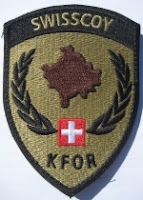SwiSS Neutrality Nazi Style?
As a haven for tax evaders and money launderers, and the home of Bank for International Settlements (BIS), the world's central bank--accountable to no one--I always questioned the letter and spirit of Swiss neutrality, especially during WWII. Despite its neutral, tolerant (women didn't get the right to vote until 1971!), and peaceful image, Switzerland has a strong military, and I might add, racist, tradition. Ironically, it is Europe's best-armed nation. Military service remains compulsory for male citizens under the constitution. Moreover, for such a neutral country, they sure are very involved in the affairs of the international community.
“The country has been a member of the UN since 2002, although it has, in fact, fully participated in the activities of the specialised agencies such as Unesco, WHO, FAO, ILO, Unicef and others, for decades.And isn't it a little suspicious that this neutral policy greatly benefits and protects the same group that signed the Act on the Neutrality of Switzerland into existence: the powerful? Originally, it was the Great Powers (Austria, Britain, France, Prussia and Russia), but, nevertheless, continues to benefit and protect the assets of the wealthiest and most powerful individuals on earth.
A nationwide vote was needed to join the world body and some 55% voted in favour. Switzerland is a member of Nato's Partnership for Peace program, but there are no plans to join the military alliance, as this would compromise neutrality.
UN membership has been hailed as a major step forward into the concert of nations but, in fact, Switzerland has continually supported international peace efforts since the Second World War, while stopping short of joining UN peacekeeping forces.
The country has been involved in truce supervision work following the Korean War, and in the Middle East since 1967. Swiss election observers have been sent to Africa and eastern Europe, and a 220-strong Swiss army company (Swisscoy) has been stationed for several years in Kosovo in support of international peacekeeping efforts in the Balkans.
Switzerland was an early member of the Council of Europe, and more recently of the Organisation for Security and Cooperation in Europe (OSCE).
I mean, what made Switzerland so special that even Hitler himself seemed to respect their impartial status? Could it be that Switzerland was a secret lifeline, an endless stream of revenue for the Nazi dictator? The answer is yes, and to be fair, it was a two-way street, as there is no question that Switzerland, as well as many other great powers profited greatly from the Fuehrer's victims. Five BIS directors were tried for war crimes after WWII. Of the five, three were convicted, but served very little time.
Swiss banks not only helped fund the Nazi war effort by accepting gold and other assets, they laundered the money that Germany could use to buy material, and accept looted property that was being held for top Nazi officials; Switzerland also made it possible for top Nazi officers to escape justice. Even worse, until very recently, Swiss bank officials refused to help Holocaust survivors and the families of its victims claim THEIR assets, insisting, among other things, on death certificates for people who perished in the concentration camps.
Interestingly, the dissolution of the Knights Templar occurred at the same time as the founding of Switzerland...okay, two months later. The Swiss cross is a simplified Templar's cross, using the same color combination. Look at the following pictures of the Nazis invading Poland in 1939. Notice the distinctive white crosses--the same cross displayed on the Swiss flag--on the tanks, which, mysteriously disappeared from view at a later time. Make of it what you will.
 |
| Nazi tanks roll into Poland - September 1939 |
 |
| Germans invade Poland - September 1939 |
“The Power of financial capitalism had [a] far reaching plan, nothing less than to create a world system of financial control in private hands able to dominate the political system of each country and the economy of the world as a whole.
This system was to be controlled in a feudalistic fashion by the central banks of the world acting in concert, by secret agreements arrived at in frequent meetings and conferences.
The apex of the system was to be the Bank for International Settlements in Basel, Switzerland, a private bank owned and controlled by the world's central banks, which were themselves private corporations.
Each central bank sought to dominate its government by its ability to control treasury loans, to manipulate foreign exchanges, to influence the level of economic activity in the country, and to influence co-operative politicians by subsequent rewards in the business world." -- Carrol Quigley, Tragedy and Hope, 1966 - [Bill Clinton's mentor and Georgetown University professor]


0 comments:
Post a Comment